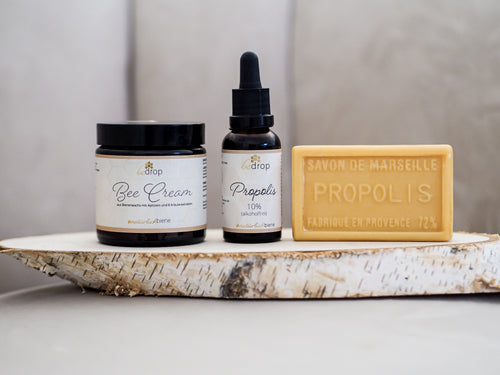ABOUT PROPOLIS AND MANUKA
Propolis tincture
Propolis is known as the bee resin that bees use for insulation and repair work when building the hive. Propolis keeps out unwanted visitors and other insects. The seal prevents moisture and bacteria from entering the hive and the returning bees use the propolis as a kind of disinfectant. By rubbing the propolis at the entrance, the bees are disinfected and the bacteria remain outside the hive. For this reason, propolis is said to have an antibiotic, disinfecting effect, which can help heal inflammations and other infections. The propolis produced by the bees contains important nutrients such as calcium and zinc, which can have an anti-inflammatory and preventative effect. The best known and therefore most practical form of propolis is tincture (propolis tincture). Many beekeepers who own their own hives are often unaware of the significance of the bee product propolis. In many cases, this bee resin plays too small a role alongside honey. The propolis produced by the bees is collected by the beekeeper so that it can be reused. Bee resin or

Propolis is a solid and slightly brittle product. To turn it into a propolis tincture, the organic substance must be extracted with ethanol. During extraction, the solid propolis is transformed with the alcohol into a suspension, the propolis tincture. This tincture contains the nutrients and active ingredients of the propolis. Most propolis tinctures are fitted with a pipette cap. The pipette enables dosing with drops. These drops are a great advantage for the propolis tincture, as the drops can be applied more precisely to the desired area and dosed better. You can buy propolis tincture in different sizes, and the percentage of propolis in the alcohol (ethanol) also varies. The best-known tinctures have a propolis content of 10%, 20% and 30%. You can buy 5% (alcohol-free) and 20% propolis tinctures from us.
Propolis tincture and areas of application
You can use propolis tincture for the following external applications:
- Strengthening vitality
- Skin inflammations
- skin impurities
- Sunburn and other minor burns on the skin
- Skin irritations
- Wounds and other small abrasions or cuts
- Eczema / neurodermatitis / dermatitis
- injuries
What makes Manuka honey so special?
The special feature of Manuka honey lies primarily in the fact that the bees collect the nectar from the flowers of the Manuka plant (also known as South Sea myrtle) and process it into honey in the beehive. The manuka bush grows exclusively in New Zealand and can only be found there (it is still not known why this is the case). Manuka honey is said to have an antibacterial and antibiotic effect due to the substance methylglyoxal (MGO) it contains. The higher the MGO content in Manuka honey, the greater the effect of the honey. Genuine Manuka honey comes 100% from New Zealand (from the beekeeper) and should also be certified accordingly. Our bedrop Manuka honey is certified with an MGO content of 400+ and is 100% from the best areas and beekeepers in New Zealand.
Areas of application of New Zealand Manuka Honey
Manuka honey has a wide range of applications. As with any other honey, it can be used as a "normal" honey spread. It can be used as a sweetener for milk, tea or other drinks. It is important to ensure that the drink is not warmer than 70°C, otherwise the honey loses its effect. In the case of tea, the honey should be stirred in after a brewing time of 5 minutes. Manuka honey can be taken to support the immune system and inflammations such as gastrointestinal, respiratory or bladder infections.
In addition to internal use, manuka honey can also be used for external complaints. It can help heal wounds or inflammation of the eyelids.
In cosmetics, honey is used in the form of face masks or facial tonics to treat acne or other skin blemishes. The possible anti-inflammatory properties are due to the fact that honey removes the water from the bacteria so that they cannot multiply and survive.

























